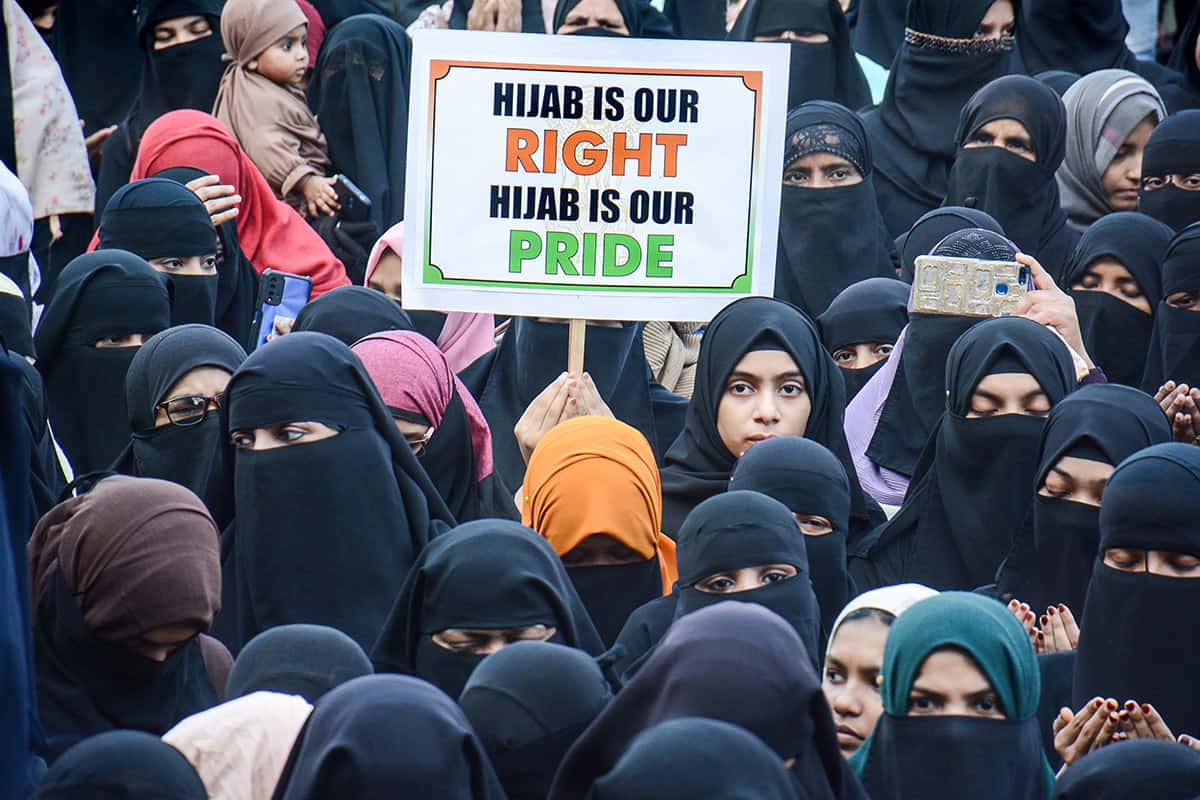In a significant development, Karnataka’s newly formed government, led by the Congress party, has indicated its intention to revise or withdraw several orders and legislations implemented by the previous Bharatiya Janata Party (BJP) regime. Priyank Kharge, a minister in the Karnataka government and the son of Congress President Malliarjun Kharge, suggested that the government would carefully reevaluate these policies, considering their alignment with the state’s interests and constitutional values. This announcement comes amidst mounting demands to overturn the controversial “hijab ban” that has sparked debates on political and religious grounds.
 The controversy surrounding the wearing of hijabs in classrooms gained prominence in 2022 when the state government issued an order effectively banning its usage in government-run colleges. However, Priyank Kharge’s recent statement signifies a potential shift in the government’s stance on this matter. While he refrained from directly addressing the issue, Kharge affirmed that the new government would review all policies introduced by the previous administration that contravene the principles of inclusivity, societal development, and constitutional adherence.
The controversy surrounding the wearing of hijabs in classrooms gained prominence in 2022 when the state government issued an order effectively banning its usage in government-run colleges. However, Priyank Kharge’s recent statement signifies a potential shift in the government’s stance on this matter. While he refrained from directly addressing the issue, Kharge affirmed that the new government would review all policies introduced by the previous administration that contravene the principles of inclusivity, societal development, and constitutional adherence.
“We will reevaluate every policy implemented by the previous government,” Kharge emphasized, indicating the government’s commitment to rectifying policies that undermine the state’s progress, economic growth, and the welfare of its residents. This includes legislation related to textbook revisions, anti-cow slaughter, and anti-conversion laws. Kharge reiterated the government’s intention to withdraw bills and orders that impede Karnataka’s economic prosperity and adversely affect the well-being of its citizens.
New Karnataka Government, Led by Congress, Considers Reversing ‘Hijab Ban’: Priyank Kharge
Among the specific issues highlighted by Kharge was the selective observance of certain birth anniversaries by the previous government, leaving out others. He emphasized that the government would address these imbalances and ensure the fair recognition of all prominent figures. Additionally, the government aims to reassess the policies concerning textbooks, anti-cow slaughter, and anti-conversion laws, with the intent of aligning them with the state’s overall progress and the interests of its people.
 The overarching goal of the new Karnataka government, as stated by Kharge, is to restore Karnataka’s status as a leading state in terms of economic development and prosperity. He expressed the government’s unwavering commitment to taking necessary steps to achieve this objective. With the withdrawal of counterproductive bills and orders and the formulation of progressive policies, the government aspires to reestablish Karnataka’s position as a frontrunner in various spheres.
The overarching goal of the new Karnataka government, as stated by Kharge, is to restore Karnataka’s status as a leading state in terms of economic development and prosperity. He expressed the government’s unwavering commitment to taking necessary steps to achieve this objective. With the withdrawal of counterproductive bills and orders and the formulation of progressive policies, the government aspires to reestablish Karnataka’s position as a frontrunner in various spheres.
Priyank Kharge’s remarks come in the wake of the recent induction of eight ministers into Chief Minister Siddaramaiah’s cabinet. These developments signify a renewed approach by the Congress-led government in Karnataka, with a strong focus on reviewing and amending policies to foster inclusivity, constitutional compliance, and the state’s overall progress.
As the new government takes the reins in Karnataka, its commitment to revisiting contentious policies and prioritizing the interests of the state and its residents is poised to shape the course of governance. By promoting inclusivity, economic growth, and social harmony, the government aims to create an environment conducive to the well-being and prosperity of the people of Karnataka.
This progressive approach by the new government in Karnataka reflects a willingness to address public concerns and ensure that policies are in line with the principles of inclusivity and constitutional values. By undertaking a comprehensive review of the previous government’s decisions, the Congress-led government aims to rectify any perceived imbalances and promote a more harmonious and equitable society.
The issue of the “hijab ban” has been a subject of considerable debate and controversy, with proponents arguing for the preservation of religious freedom and opponents emphasizing the need for uniformity and secularism in educational institutions. The indication of a potential revision or withdrawal of the ban by the new government suggests a more nuanced and inclusive approach to this sensitive matter.
It is noteworthy that the Congress government in Karnataka is taking a proactive stance by reevaluating various policies that have been called into question. This demonstrates their commitment to good governance and their willingness to listen to the concerns of the people. By reviewing and amending policies that are perceived to be detrimental to the state’s progress and the well-being of its citizens, the government aims to foster an environment of trust, cooperation, and growth.
The government’s focus on withdrawing laws and orders that hinder economic progress and negatively impact the people of Karnataka indicates a strong commitment to prioritize the state’s development. This approach aligns with the government’s intention to regain Karnataka’s status as a leading state in terms of economic growth and prosperity. By eliminating counterproductive measures, the government seeks to create an atmosphere conducive to investment, entrepreneurship, and overall economic well-being.
Reevaluating Policies: Karnataka’s New Government Prioritizes Constitutional Values and Inclusivity
The induction of eight ministers into Chief Minister Siddaramaiah’s cabinet further underscores the government’s determination to govern effectively and address the needs of the people. The inclusion of competent and diverse voices in the decision-making process is a positive step towards inclusive governance and ensuring that the interests of all sections of society are taken into account.
The Congress-led government’s commitment to reviewing policies extends beyond the “hijab ban” issue. By pledging to reassess various aspects, such as textbook revisions, anti-cow slaughter laws, and anti-conversion bills, the government aims to strike a balance between preserving cultural heritage, religious freedom, and maintaining social harmony. This comprehensive review process demonstrates a commitment to evidence-based decision-making and an openness to considering the diverse perspectives of stakeholders.
As the new government in Karnataka embarks on its tenure, it faces the responsibility of balancing the aspirations and expectations of the people with the practical challenges of governance. By displaying a willingness to reevaluate and amend policies, the government is taking a significant step towards fostering an environment of inclusive growth and progressive governance.
Overall, the indications provided by Priyank Kharge regarding the Congress government’s plans to revise or withdraw certain orders and legislations in Karnataka reflect a positive and forward-thinking approach. Through this reassessment, the government aims to align policies with constitutional values, societal inclusiveness, and economic progress. As Karnataka enters this new phase of governance, the focus on good governance, equitable decision-making, and inclusive growth sets a promising trajectory for the state’s future.

